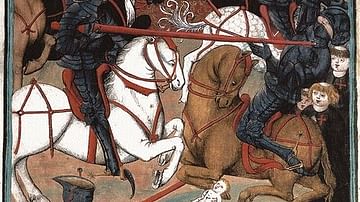Search
Search Results

Article
Cats in the Middle Ages
Cats in the Middle Ages were generally disapproved of, regarded as, at best, useful pests and, at worst, agents of Satan, owing to the medieval Church and its association of the cat with evil. Prior to the widespread acceptance of Christianity...

Article
1521 Excommunication of Luther: Complete Text
In response to Martin Luther's 95 Theses, as well as his other works, Pope Leo X sent a papal bull threatening him with excommunication in June 1520. Luther publicly burned the bull at Wittenberg on 10 December 1520 and was officially excommunicated...

Article
Battle of Civitate
The Battle of Civitate was fought in southeastern Italy on 18 June 1053 between a papal army of Pope Leo IX (r. 1049-1054) and an outnumbered force of Norman knights seeking recognition of their conquests and titles. The Normans were victorious...

Article
Architects of France's 1901 Law of Associations
The Law of Associations was adopted by the French Parliament on 3 July 1901 to limit the influence of Catholic teaching orders as the first step toward the formal separation of church and state that would follow in 1905. Of 16,904 religious...

Article
Religious Responses to the Black Death
The Black Death of 1347-1352 CE is the most infamous plague outbreak of the medieval world, unprecedented and unequaled until the 1918-1919 CE flu pandemic in the modern age. The cause of the plague was unknown and, in accordance with the...

Definition
Doctrine of Discovery
The Doctrine of Discovery is a policy enacted initially by the 15th-century Catholic Church proclaiming the right of Christian nations to take possession of the lands of non-Christians in the interest of saving their souls. Non-Christians...

Definition
Magna Carta
The Magna Carta or 'Great Charter' was an agreement imposed on King John of England (r. 1199-1216) on 15 June 1215 by rebellious barons in order to limit his power and prevent arbitrary royal acts like land confiscation and unreasonable taxes...

Definition
Sixth Crusade
The Sixth Crusade (1228-1229 CE), which for many historians was merely the delayed final chapter of the unsuccessful Fifth Crusade (1217-1221 CE), finally saw the Holy Roman Emperor Frederick II (r. 1220-1250 CE) arrive with his army in the...

Definition
Hussite Wars
The Hussite Wars (1419 to c. 1434) were a series of conflicts fought in Bohemia (modern-day Czech Republic) between followers of the reformer Jan Hus and Catholic loyalists toward the end of the Bohemian Reformation (c. 1380 to c. 1436...

Definition
Ignatius of Loyola
Ignatius of Loyola (l. 1491-1556) was a Basque soldier who became a Catholic priest and theologian after a mystical experience convinced him he was called to the service of Christ. He founded the Society of Jesus (Jesuits) to defend the Church...